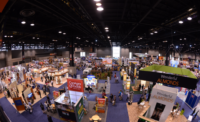At-a-Glance: Embaré
Types of caramels: Assorted Caramels, Assorted Toffees, Bocaditos Caramel, Chocolate Caramel, Condensed Milk Caramel, Fruit Chews, Guava Filled Caramel, Milk and Chocolate Caramel, Milk and Coconut Caramel, Milk Caramels, Mini Caramels, Orange Chocolates, Strawberry Filled Caramels, Yoghurt Fuirtmix.
Locations: Its offices are Belo Horizonte, Brazil,
Its 34,000 sq.-meter industrial plant in Lagoa da Prata, Brazil.
Website: www.embare.com.br
Employees: 1,340
Annual sales: R$760 millions Brazilian Reals
It turns out Brazil is a tricky country to make caramel for. With high temperatures in the north and the cold weather in the south, it’s hard to concoct exactly the right mix of chewy and creamy caramel that won’t melt.
But Embaré caramels are perfect for Brazil. And as such, they’re also pretty much perfect for the world.
Made with Brazilian fruit flavors and fresh milk and yogurt, they are one of the country’s easiest candies to understand as an outsider. Put simply: caramel plus Brazilian fruit flavors equals a delicious export.
Solange Isidoro, Embare’s export manager, has worked hard to make the company’s caramels sweet enough for the world to enjoy.
She takes the time to learn about the cultures where the product is sold, and she works with local distributors around the world to ensure she’s not missing anything.
“There is a culture aspect in the export that you need to understand,” she explains. “There are small things you learn about other cultures before you even go to a show.”
For example, in Japan, you don’t touch anyone you’re talking to, and in many Middle Eastern countries, you have to use you halal gelatin.
“When you export, you are the one who has to follow the rules,” Isidoro says. “We don’t have any shame in asking our distributors for advice.”
All these efforts seem to be working for Embaré. The company’s exports have grown about 20 percent a year for the last 15 years.
But they aren’t resting on their laurels. They’re constantly working in research and development to come out with new caramels — a peanut caramel and a coffee caramel are currently in the works. And they’re even working on a trans-fat free caramel.
“We’re always coming up with new flavors,” Isidoro says.
For the recent 2014 World Cup in Brazil, they released a green and yellow package, inspired by the main colors of the country’s flag. Featuring typical Brazilian artwork, the so called “Brazilian Delights” are colorful caramels flavored with different fruits.
Founded in 1935, in the city of Taubaté, Brazil, Embaré originally focused on making milk fudge, milk jam, fruit fudges and vegetable soups.
In 1973, the company expanded its confectionery capabilities. After investing in new machinery they expanded the fudge and dairy production plants, and thus started manufacturing fudge, caramel candies, milk powder and butter.
By 1975, Embaré was exporting and marketing its caramel candies to all five continents.
Then, in the 1980s, Embaré started a partnership with Kraft Inc., which allowed it to acquire state-of-art technology and launch a variety of new products. Kraft was involved in Embaré for about five years, before selling off the shares as part its efforts to de-invest in South America.
By the 1990s, Embaré was growing again, and in 1994 the company implemented an expansion program, investing nearly 6 million Brazillian Reals in its fudge production sector and in upgrading its equipment.
Today, the company has an annual turnover of 1 Billion Brazilian Reals, with 1,340 associates working at its offices located in the city of Belo Horizonte, MG, Recife, PE, and its 34,000 sq.-meter industrial plant in Lagoa da Prata in the Central-West region of the state of Minas Gerais.
Embaré still makes the milk powder that it first started with all those years ago, but it’s the caramels that have the export value. In fact, the company exports them to more than 40 countries.
Embaré also takes quality and safety seriously.
In 2003, it achieved ISO 9001 and ISO 14001, Quality Management System and Environmental Management, respectively. And, the company is in the running for FSSC 22,000, which will be ready next year.
All of the employees have to shower before starting work, and there are multiple metal detectors along the manufacturing line. They also keep a bag of candy from every single batch they make so they can trace any problems back to the source.
But going back to the beginning of the process, the caramels start off as large slabs of gooey caramel candy cut and laid out to dry. Then, the slabs are run through an extruder, and eventually cut into the various size pieces Embaré offers.
After that, they’re individually wrapped, packaged and then boxed up and ready to ship — be it across to the street to the company store, or across the world.
Lucky for the world, these Brazilian Delights are available pretty much anywhere.














